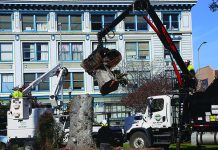WATSONVILLE—Watsonville will have yet another tool that it could use to try to fix its housing shortage if the City Council follows the Planning Commission’s recommendations to approve wholesale changes to rules for accessory dwelling units (ADUs), also known as “granny flats” or “granny units.”
The proposed changes, in short, would bring the city’s rules in alignment with several state housing bills passed over the last four years that have streamlined the construction of ADUs and Junior ADUs, the latter also known as JADUs and defined as living units that are created within the walls of a proposed or existing single-family residence.
Those state bills included the reduction of parking requirements, application review time and fees collected by municipalities, which must now adopt an ordinance that is consistent with state law.
The Planning Commission voted 4-1 to recommend the City Council at a future meeting approve the proposed changes put forth by city staff.
Commissioner Ed Acosta was the lone “no” vote. He requested the vote be delayed to a future meeting, a motion that did not receive a second from a commission with two vacant seats—commissioners Phillip F. Tavarez and Jenna Rodriguez recently stepped down from the volunteer body.
Acosta contested that the proposed rules would further aggravate a problem plaguing Watsonville neighborhoods: the construction of “monstrosorous” ADUs.
“We’re talking about this tonight, and yet we can’t even control what we’re doing in our own backyard,” he said. “I am for ADUs—I’m not saying I’m not—but I think we really need to take into consideration your neighbors.”
With housing—especially of the affordable variety—in short supply, many lawmakers across the state are touting the tiny developments as big difference makers.
An ADU, the California Department of Housing and Community Development says, is a low-cost project that can provide an additional dependable source of income for homeowners and help house seniors, young people, small families or friends that are looking for cheap, no-frills housing.
The city has seen an uptick in ADU construction since the state’s new laws went into effect on Jan. 1, Associate Planner Ivan Carmona said.
“We’ve received a lot of outreach from the community, as far as wanting to do ADUs,” he said. “People have been submitting and we have been approving ADUs, and I think people are waiting for our ordinance to really have an understanding of what they can do.”
The city has not updated its rules on ADUs since 2003. The proposed updates, staff said, would address some of the concerns Acosta brought forward, including building height and property line setbacks.
ADUs would be allowed in most residential areas, have a height limit of 28 feet and must meet a minimum 4-foot property line setback. Conversions of an existing structure, however, are not required to meet setback requirements so long as they do not exceed the 16-foot height limit.
City staff is proposing that properties of 10,000 square feet or less be allowed to construct one ADU of varying size (850-1,200 square feet) and maximum bedrooms (1-3 bedrooms). Properties of 12,000 square feet or greater would be allowed to construct one ADU of 1,200 square feet and a maximum of three bedrooms, or two ADUs of 750 square feet and two bedrooms.
A maximum of one off-street parking space is required for every ADU or JADU, though that can be waived if the project meets certain criteria such as its proximity to public transit.
Impact fees can, too, be waived if an ADU is 750 square feet or less, and separate utility connections are not required for an ADUs under 800 square feet.
In addition, under the proposed changes owners who illegally constructed non-permitted ADUs or JADUs before Jan. 1 can request a five-year delay in code enforcement if they come forward to legalize their units through the Community Development Department. Those who do come forward to obtain the proper permits will see a 50% reduction in building fees.
CDD said between July 2019 and May 2020 it received complaints about 70 illegally constructed ADUs, 90% of which city staff confirmed were constructed without proper permits. That, Carmona said, is a direct result of stringent rules and regulations on ADU construction.
“We have illegal units because we have ordinances that don’t allow flexibility for development. So since people can’t do it, what are they going to do? They’re just going to construct no matter what,” Carmona said.
The Planning Commission postponed a decision on a proposed propane storage and transfer facility set to be constructed at 950 W. Beach St.
CDD Director Suzi Merriam said they postponed the vote because an adjacent property owner did not receive notice of the meeting. Merriam said the city’s list of property owners within 300 feet of the property used to determine who they needed to notice was outdated.
The item is now scheduled for the Planning Commission’s Sept. 1 meeting.
The project would reshape a vacant 0.7-acre lot by installing a new railcar unloading tower and two new tank unloading stations. It would also refurbish and move an already existing 50,000-gallon propane tank. The project has the potential to add four additional 30,000-gallon propane tanks.
Richard Kojak of Mountain Propane Service in Felton owns the property and is leading the project. David Dauphin of C2G/Civil Consultant Group in Scotts Valley is listed as the applicant.
Hampton Inn & Suites gets alcohol license
The Planning Commission unanimously approved a new Type 70 license from the California Department of Alcoholic Beverage Control for the fast-moving Hampton Inn & Suites hotel on 75 Lee Road.
The license will allow the hotel, which is being constructed by Juggy Tut and Elite Hospitality Group LLC of Watsonville, to sell beer, wine and distilled spirits at its snack shop from 6am to 11pm.













